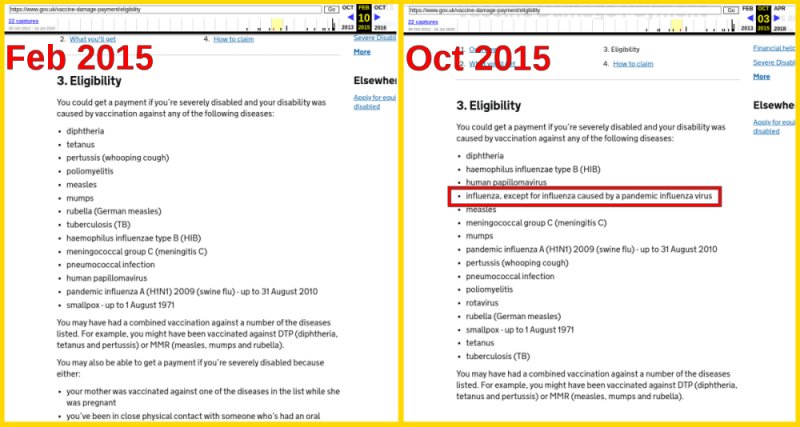- In July Health Secretary Matt Hancock claimed that conspiracy theorists are putting lives at risk
- The UK government’s Vaccine Damage Payment scheme is proof that vaccines can be unsafe
- Eligibility criteria Vaccine Damage Payment changed in 2015
- Update October 2020: AstraZeneca protected from vaccine liability
- Update November 2020: MHRA expects high volume of COVID-19 vaccine adverse drug reaction
- Update December 2020: Pfizer is given protection from legal action by the UK government
Discussion around vaccinations can be very contentious. There’s great nuance in this area and a short post will not do justice to the complex issues surrounding the usefulness and safety of vaccines. Nevertheless, while vaccines may have their role in protecting target populations from disease, not all have been proven safe to an acceptable level as shown in the resources below.
The UK government’s Vaccine Damage Payment scheme is probably the strongest proof that vaccines can be unsafe. Under the Vaccine Damage Payment scheme, people who have been severely disabled as a result of a vaccination against certain diseases can be eligible for a one-off tax-free payment of £120,000.
Conspiracy theorists are putting lives at risk?
It is an objective fact that a compensation scheme exists for those who have been damaged by vaccines. Nevertheless, Health Secretary Matt Hancock claimed that conspiracy theorists are putting lives at risk:
“Those who promulgate lies about dangers of vaccines that are safe and have been approved–they are threatening lives…”
Source: The Independent, 20 July 2020
Clearly, concerns about the safely of vaccines cannot be lies if there is a vaccine damage compensation scheme in place.
Eligibility changed in 2015
Eligibility requirements for vaccines covering certain diseases are listed and change over time. Interestingly, sometime around 2015, damage from vaccines for influenza caused by pandemics are explicitly listed as not eligible.

We do not know how the government compiles is eligibility criteria or why this change was made. However, it would be worthwhile to keep an eye on this list to see if the status of the upcoming COVID-19 vaccines.
AstraZeneca protected from vaccine liability
Update 1 August 2020: On 30 July 2020, Reuters reported that AstraZeneca, the UK government’s partner for developing its COVID-19 vaccine, will be exempt from coronavirus vaccine liability claims in most countries. The countries have not been named but Ruud Dobber, a member of Astra’s senior executive team, commented:
“This is a unique situation where we as a company simply cannot take the risk if in … four years the vaccine is showing side effects.
In the contracts we have in place, we are asking for indemnification. For most countries it is acceptable to take that risk on their shoulders because it is in their national interest.”
MHRA expects high volume of COVID-19 vaccine adverse drug reaction
Update November 2020: It came to light in mid-November that the UK’s Medicines & Healthcare products Regulatory Agency (MHRA) put out a contract award notice for an Artificial Intelligence (AI) software tool. It appears they expect a high volume of COVID-19 vaccine Adverse Drug Reaction (ADRs) from the upcoming vaccines:
…it is not possible to retrofit the MHRA’s legacy systems to handle the volume of ADRs that will be generated by a Covid-19 vaccine. Therefore, if the MHRA does not implement the AI tool, it will be unable to process these ADRs effectively.
Pfizer given legal indemnity
Update 2 December 2020: According to the Independent, Pfizer now has a legal indemnity from being sued by patients who develop any complications from its new mRNA vaccine that will be rolled out in the UK. NHS staff providing the vaccine will also be protected.
Resources
- UK Government Vaccine Damage Payment (gov.uk)
- Ministers lose fight to stop payouts over swine flu jab narcolepsy cases (The Guardian)
- Dengue vaccine fiasco leads to criminal charges for researcher in the Philippines (Science Magazine)
- Polio outbreaks in Africa caused by mutation of strain in vaccine (The Guardian)
- Pakistan accused of cover-up over fresh polio outbreak – (The Guardian)
- The Vaccination Debate (The Guardian)
- AstraZeneca to be exempt from coronavirus vaccine liability claims in most countries (Reuters)
- Zostavax Lawsuit (ClassAction.com)
- Pfizer to pay £50m after deaths of Nigerian children in drug trial experiment (The Independent)
- MHRA urgently seeks software tool to process the expected high volume of Covid-19 vaccine Adverse Drug Reaction (Tenders Electronic Daily)
- Pfizer given protection from legal action by UK government (The Independent)
View all articles related to COVID-19 and vaccination.